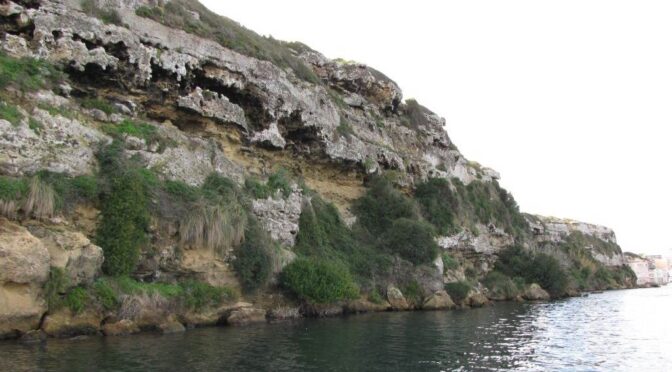Views: 1085
The Port of Maó is a result of Menorca’s great geological fault, the point where the stark contrast between the rocky mosaic of the Tramuntana region and the uniformity of the southern sandstone (marès) is most evident. This contrast is mirrored in the shores on either side of the port.
To the north, the land gently merges with the sea, forming small coves and beaches. These shallow areas are home to rich marine life, including plants and animals of significant ecological value. This is where cockles were once plentiful, buried in sediments of silt and gravel.
To the south, cliffs plunge dramatically into the sea, revealing striking depths. This is where date mussels were once harvested—a practice that, due to unsustainable methods, has almost completely wiped them out.
Those who monitor the ecological evolution of the port have noted signs of environmental recovery. Perhaps one day we could once again be a benchmark for high-quality shellfish production, as we were in the early 20th century.
This large, sheltered space is also an ideal observation point for schools of small fish, or fry, which instinctively seek out shallow, protected areas to evade constant predator attacks. Feeling the vibrations of approaching threats, finding safe havens, and having quick reflexes are essential traits for those aiming to reach adulthood.
However, above all these individual attributes, the most critical requirement for survival is the ability to swim in unison with the community. Isolation makes one far more vulnerable.
Perhaps it was by observing fish that the designers of today’s societal models realized the power of isolation. By isolating individuals, they could become more docile, more easily controlled, and far less resilient—stripped of their role as active citizens and relegated to obedient consumers.
The rhetoric of individual freedom and personal success carries a hidden agenda worth contemplating. The current epidemic of adolescents glued to their phones and the rise of depression in urban areas could be closely linked to the intentional isolation of individuals from their communities.
As we bid farewell to 2024, we also celebrate the bicentenary of Josep A. Clavé—a writer, composer, and, above all, a staunch advocate for collective causes. His timeless advice remains relevant today: “Educate yourself, and you will be free; join together, and you will be strong.”
This year has also taken some exemplary individuals from us—people who consistently extended a hand to build a thriving community. May their memory inspire us to follow in their footsteps, to persevere, and to embrace the mindset that sometimes we win, other times we learn.
Our communities are also at a crossroads. It’s time to bet on collective action, to look up and connect with others. To seek knowledge for freedom, association for strength, and fulfillment in simple joys. Like watching the life of fish along the shore.
(This text is an adaptation of the original article published by Miquel Camps, as coordinator of territorial policy for the GOB, in the Menorca newspaper on 23/12/2024).

